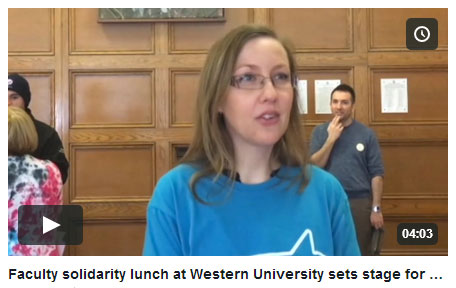The government is currently considering changes to employment and labour law that could bring more fairness to workplaces across the province. More than ten faculty associations presented at the recent hearings on Bill 148, Fair Workplaces, Better Jobs Act about how the bill can deliver fairness for contract faculty, including equal pay for equal work, fair scheduling, and more secure and stable jobs. Faculty also addressed the importance of the right to join a union and better options for consolidating bargaining units.

On the need for fairness for contract faculty:
“In recent years, universities in Ontario have increased their reliance on contract faculty. Although not always visible from the outside, they have created a system where there’s a clear distinction between those with good jobs and those without. Bill 148 has the potential to improve contract faculty’s conditions of work by setting out fair and equitable minimum standards.”
Amanda Burk, Nipissing University Faculty Association presenting in North Bay
“I have been teaching in the Math Department at Laurier for more than 10 years as a contract faculty professor. I have to apply for essentially the same job year after year and am hired per course each semester. We are looking to create a fair workplace and better jobs so that we can ensure our students receive the best education possible. We are hopeful about Bill 148.”
Anne-Marie Allison, Wilfrid Laurier University Faculty Association presenting in Kitchener-Waterloo
“This fall marks the beginning of my 20th year teaching at Laurier. To date I have signed close to 100 contracts. In the weeks leading up to the beginning of each term I worry. Every September, January and May – 58 times in the last 20 years – I can’t seem to breathe. As a single mother of two, the constant spectre of unemployment looms large in my life and the life of my family.”
Kimberly Ellis-Hale, Wilfrid Laurier University Faculty Association presenting in Kitchener-Waterloo
“Would you believe that I had more job security working at Burger King in grade 9 than I do as an academic with a PhD who is research-active, with an established record of teaching excellence? And, I am certainly not alone. My story echoes those of academics across this province.”
Frankie Cachon, Windsor University Faculty Association presenting in Windsor
“You don’t make much as a contract lecturer, and you never know how much you’re going to be making in the future. You may have no courses, some courses… When you’re working at a university, people think you’re making all this money, but there are 68 of us [at Lakehead University] who are not. We’re living in very precarious positions.”
Laurie Forbes, Lakehead University Faculty Association presenting in Thunder Bay
“More than a few of my contract colleagues teach at more than one institution in an attempt to cobble together some kind of livable income. So they’re teaching here in North Bay, but will also be driving to Toronto, Sudbury and some as far as Kingston every week to teach courses at other institutions just to try to make a liveable wage.”
Amanda Burk, Nipissing University Faculty Association presenting in North Bay
“When I talk about precarious work, the students are always, ‘We get it, Miss. We have those very jobs. I just can’t believe you do, but we have them too.’ They get it.”
Frankie Cachon, Windsor University Faculty Association presenting in Windsor
On the importance of equal pay for equal work:
“A contract faculty member who teaches a specific course should be paid for that course, the same amount that a full-time faculty member is also paid to teach the same course. That seems to me unassailable, if we are truly committed to the idea of equal pay for equal work.”
Stephen Pitel, University of Western Ontario Faculty Association presenting in London
“The people doing this teaching are all professors, professionals. Myself, I’m an adjunct. I’m a professional engineer. I have a PhD, just like my colleagues next door to me. I win teaching awards. While the expectations of university teaching done by adjunct faculty and tenure-stream faculty are the same, their compensation is not. All workers should receive equal pay for work of equal value and equal access to benefits.”
Jordan Morelli, Queen’s University Faculty Association presenting in Kingston
“Suppose I am teaching physics and another colleague, on contract, is also teaching physics. We are both teaching first-year physics, teaching the same number of students. The question is, why would he make less compared to me? I want to see my colleague who is in the contract position being treated like me.”
Gautam Das, Lakehead University Faculty Association presenting in Thunder Bay
“Highly qualified instructors have no employment security, comparatively low pay, and in many cases no pension or benefits. And, while Bill 148 says that no employee shall be paid a rate lower than a comparable full-time employee of the same employer, there are broad exemptions to this rule. What Bill 148 can do, and what I, on behalf of FAUW urge you to do, is to make exploitive hiring options economically unattractive at universities.”
Sally Gunz, Faculty Association at the University of Waterloo presenting in Kitchener-Waterloo

On decent work for all and the right to join a union:
“We are broadly supportive of the bill. With the big-ticket items, with minimum wage and other protections, although they may not directly impact librarians and archivists, we can see the benefits of those for the broader campus community.”
Shawn Hendrikx, University of Western Ontario Faculty Association Librarians and Archivists presenting in London
“University faculty are part of the broader labour movement, and we see the need for labour law improvements to enable all Ontario employees who are not presently unionized to decide for themselves if they wish to organize.”
Geoffrey Hudson, Northern Ontario School of Medicine Faculty and Staff Association presenting in Thunder Bay
“I firmly believe that a $15 minimum wage advances both social justice in this province and makes good economic sense. A $15 minimum wage will help lift low-wage workers out of poverty.”
Simon Black, Brock University Faculty Association presenting in Niagara
On improving options for consolidating bargaining units:
“At UOIT, we have been forced into fragmented bargaining units by the present labour relations legislation, and this has been detrimental to employees at the university. We will become more ossified over time unless we are allowed to normalize our relations through consolidation.”
Mike Eklund, University of Ontario Institute for Technology Faculty Association presenting in Kingston
“Our librarians and archivists unit has approximately 50 members, whereas the faculty unit has over 1,200. Since the librarians and archivists certified, UWOFA has sought to merge the bargaining units. The primary benefit of merging our bargaining units would be more efficient and cost-effective negotiations.”
Shawn Hendrikx, University of Western Ontario Faculty Association Librarians and Archivists presenting in London
Continued political pressure will be important to ensure positive measures are adopted in Bill 148 without delay. Faculty associations are committed to ongoing advocacy for fairness for contract faculty on our university campuses and at the provincial level. Faculty voices are also part of the broader Fight for $15 & Fairness that includes non-unionized and unionized workers across the province, and allies such as health providers and faith leaders.








